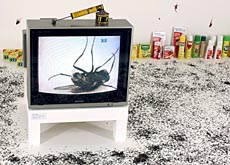
Learning to love – and to live with – flies

Six years after an exhibition during which it was “infested” with rats, a Neuchâtel museum is now “swarming” with flies – and nobody minds in the least.
Because whether the subject is vermin or disease-carrying insects, exhibitions like this one are guaranteed to attract swarms of visitors.
From malaria-spreading mosquitoes to the tsetse fly which causes river blindness, flying insects have the power to fascinate, irritate and do serious harm.
But as Neuchâtel’s natural history museum makes clear – we couldn’t live without them.
“Mosquitoes and other flies cause great trouble to humans,” said museum director Christophe Dufour. “The mainly tropical diseases they spread are responsible for the deaths of about two million people a year.
“But on the other hand,” he told swissinfo, “life on earth would be impossible without them. Just imagine the decay of all vegetal matter and its disposal. It has to disappear somehow, and the larvae of flies do a fantastic job.”
Take for example the remains of dead cattle or sheep, left to rot in the wild. As Dufour points out, without flies to devour their carcasses there would be dead animals everywhere. Meanwhile the forests would suffocate under the weight of dead leaves.
Medical role
Flies also play an important role in the field of medicine. Applied to serious wounds, their larvae can be used as a substitute for antibiotics to clean them. In layperson’s terms, this form of treatment is charmingly referred to as “maggot therapy”.
Yet mankind will go to great lengths to rid the world of many of the world’s estimated one million species of fly (6,500 of them so far recorded in Switzerland alone) some of which have been around for 200 million years.
The exhibition includes a section devoted to killer chemicals designed to shoot down flies with a whiff of aerosol spray.
But a mosquito net over the bed is probably more effective, because as Dufour says, the mosquito in particular is a cunning and resilient creature, capable of developing new immune systems.
This makes it hardly surprising that flying insects today account for about one-fifth of the Earth’s creatures, and whether we like it or not, they are here to stay.
Guilty or not guilty?
A visit to the exhibition ends in a “jury room” where visitors are invited to give their verdict, after having considered the accusations against the fly and the case for its defence.
By a majority vote, the verdict when this exhibition ends on March 6 next year could well be a guilty one.
But the mitigating circumstances are likely to result in a suspended sentence for a form of life so vital to our ecosystem.
After all, even those mosquitoes whose bite is as irritating as their buzz can be defended on romantic grounds. It seems that the high-pitched noise they make before descending on humans trying to sleep is not just the warning sound of a swooping dive-bomber.
For them, it’s a love song.
swissinfo, Richard Dawson in Neuchâtel
Flies have been around for about 200 million years.
There are an estimated one million species, about 6,500 of them in Switzerland alone.
The average life expectancy of a fly is three weeks.
They can develop immunity to killer chemicals.
While the mainly tropical diseases they spread are responsible for the deaths of about two million people a year, their larvae can have a medicinal use.
Flies are also vital for the disposal of vegetal waste and rotting animal carcasses in the wild.

In compliance with the JTI standards
More: SWI swissinfo.ch certified by the Journalism Trust Initiative
















![The four-metre-long painting "Sonntag der Bergbauern" [Sunday of the Mountain Farmers, 1923-24/26] had to be removed by a crane from the German Chancellery in Berlin for the exhibition in Bern.](https://www.swissinfo.ch/content/wp-content/uploads/sites/13/2025/12/01_Pressebild_KirchnerxKirchner.jpg?ver=a45b19f3)











You can find an overview of ongoing debates with our journalists here . Please join us!
If you want to start a conversation about a topic raised in this article or want to report factual errors, email us at english@swissinfo.ch.